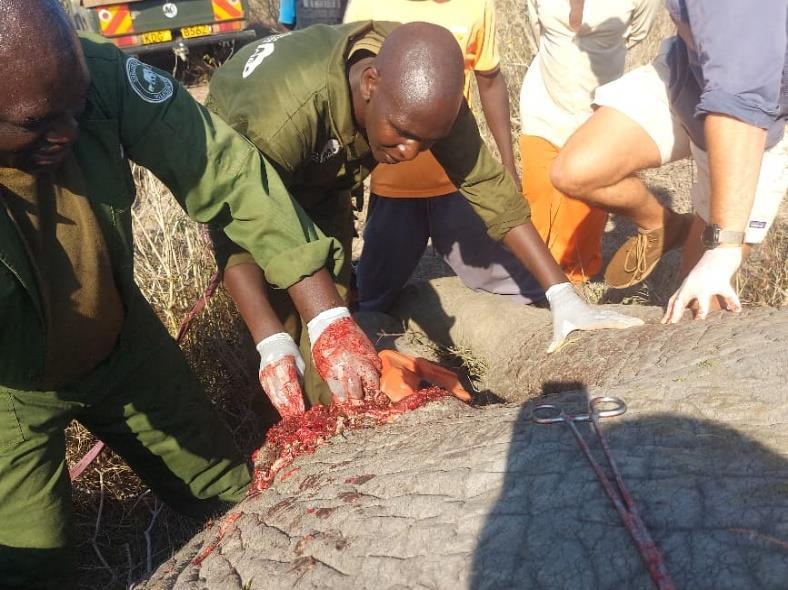

SWT/KWS TSAVO MOBILE VETERINARY UNIT
SEPTEMBER 2025
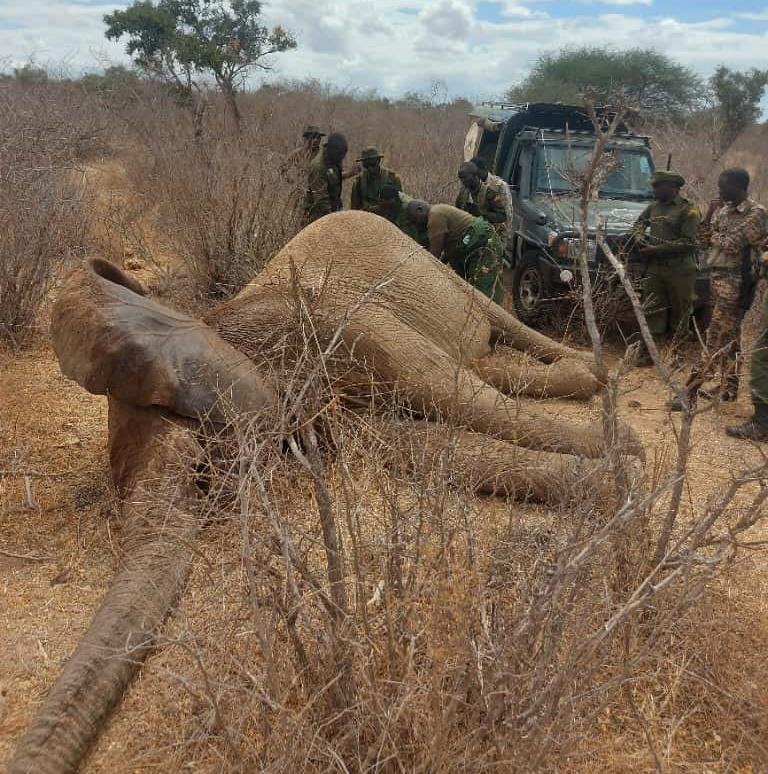




25 Cases in September 2025 14 Poaching Cases 18 Elephant Cases
September Report by Dr. Campaign Limo
The conservation area experienced insignificant precipitation towards the end of the month. A few water pans are full, and the vegetation is rapidly drying off. Most of the animals are still in good body condition. There was an increase in cases this month with a total of 25 cases attended too, the majority of which were poaching or human-wildlife conflict related, and 18 of the cases directly involved elephants
Acknowledgement
The Tsavo Mobile Veterinary Unit would like to appreciate all stakeholders who aided in monitoring and reporting of the cases that required veterinary intervention. A big thank you to KWS management for the technical support to the unit and the SWT for their continuous facilitation to the unit.
SWT/KWS Tsavo Mobile Vet Unit Treatment Locations
September 2025

Case Details
Date
Species
1-Sep-25 Elephant Lumo Conservancy Natural Causes Examination revealed a closed fracture of the left femur Prognosis Poor
3-Sep-25
4-Sep-25
5-Sep-25
5-Sep-25
8-Sep-25
8-Sep-25
8-Sep-25
Elephant Kuku Group Ranch Spear
Elephant Lunga Lunga Spear
Elephant Taita Ranches Snared
Elephant Tsavo East NP Bullet Wound
Examination revealed a deep fresh spear wound on his left flank area Successfully Treated
Examination revealed a deep spear wound on the right forelimb Prognosis Poor
Examination revealed a winch wire snare on the right knee joint Successfully Treated
This elephant had a through and through bullet wound at the knee joint Prognosis Poor
Lion Tsavo East NP Natural Causes Examination revealed deep septic wounds on the spine and on the left flank Prognosis Poor
Elephant Tsavo East NP Arrow
Examination revealed a deep septic arrow wound on the left flank area Successfully Treated
Elephant Tsavo East NP Postmortem It was concluded that the cause of death was chronic pericarditis Died
9-Sep-25 Antelope Mombasa Natural Causes Examination revealed a broken right horn. The horn had dropped off Successfully Treated
11-Sep-25 Hyena Tsavo East NP Natural Causes Examination revealed that multiple bite wounds inflicted by other hyenas
12-Sep-25
15-Sep-25
15-Sep-25
18-Sep-25
Elephant Tsavo East NP Spear
Treated
revealed deep septic spear wounds
Elephant Tsavo East NP Natural Causes Examination revealed a swollen tarsal and a suspected closed fracture Prognosis Poor
Elephant Tsavo West NP Spear
This elephant had been treated twice before for spear wounds Poaching Death
Elephant Taita Ranches Arrow Examination revealed a deep septic arrow wound on the left rump Successfully Treated
18-Sep-25 Elephant Taita Ranches Spear
20-Sep-25
Zebra Tsavo East NP Snared
20-Sep-25 Lion Tsavo East NP HWC
21-Sep-25 Elephant Amboseli NP Spear
22-Sep-25
23-Sep-25
23-Sep-25
26-Sep-25
28-Sep-25
29-Sep-25
Elephant Taita Ranches Natural Causes
Elephant Tsavo East NP Spear
Elephant Tsavo East NP Postmortem
Predator Taita Ranches HWC
Elephant Galana Ranch Bullet Wound
Lion Tsavo East NP Natural Causes
Examination revealed a deep septic spear wound on the right flank
Treated
Examination revealed a winch wire snare on her neck area Successfully Treated
The cause of death was suspected to be poisoning HWC Death
Examination revealed a deep septic spear wound on the right radiocarpal joint Prognosis Poor
Examination revealed a closed fracture of the left femur Died
An arrow wound on the hindlimb and a deep spear wound to the elbow joint Successfully Treated
An elephant carcass was found by KWS rangers in the area Died
Suspected to have been hit by a vehicle along the highway HWC Death
It had a through and through wound, from a high velocity projectile Successfully Treated
An injured lower jaw with the lower left canine partially dislodged from the gum Successfully Treated
Case
Natural Causes
Lumo Conservancy
This elephant was spotted by the KWS rangers during their routine patrols in Lumo area, limping on his left hindlimb.

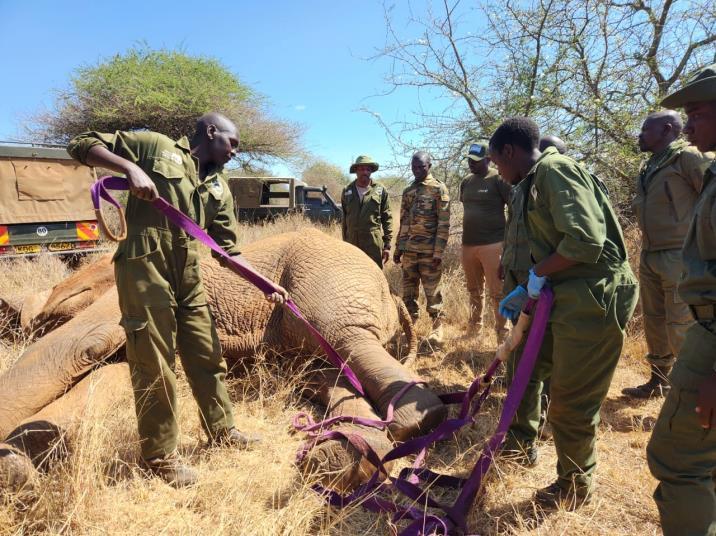
Immobilisation, examination and treatment
This bull was successfully immobilized using 18mg Etorphine hydrochloride delivered remotely in a 3cc Dan inject dart. Darting was done from foot and it took 10 minutes for the drug to achieve its full effects.
Examination revealed a closed fracture of the left femur with marked swelling around the fracture site.
He received shots of Amoxicillin antibiotics and flunixin anti-inflammatories parenterally. He was then recommended for further monitoring.
Prognosis
Prognosis is grave and recommended for euthanasia on animal welfare grounds. .
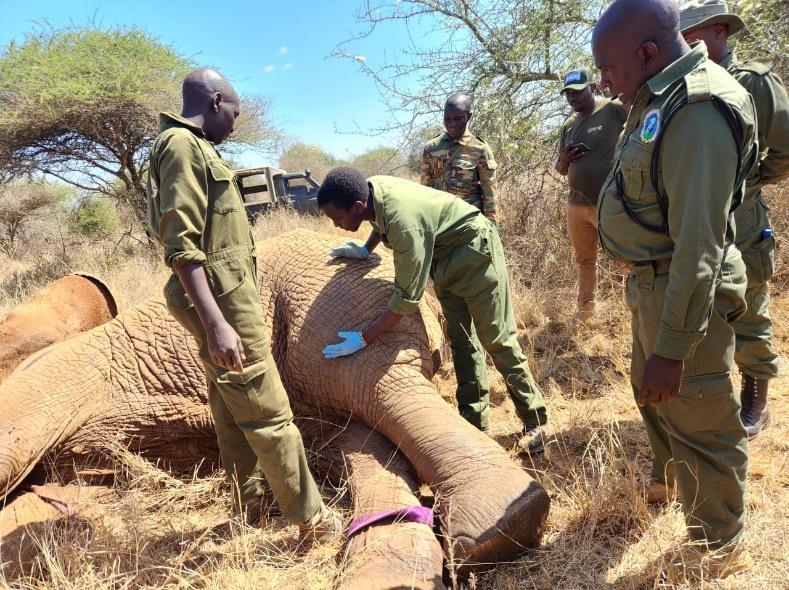
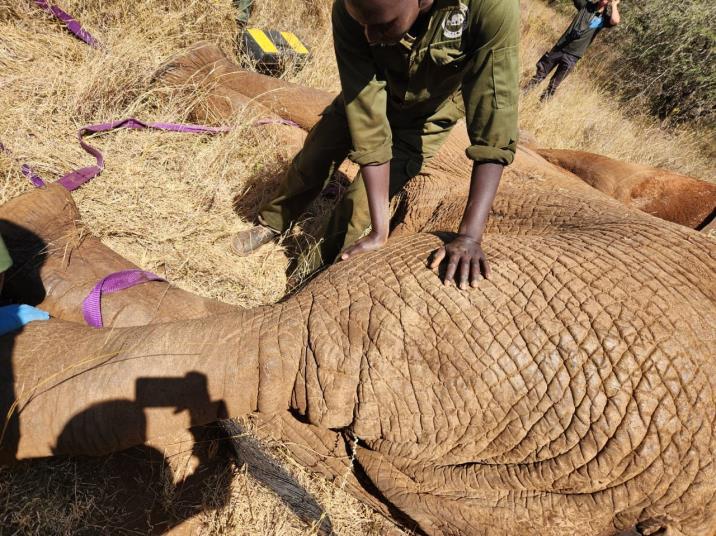
Case
Elephant Spear Kuku Group Ranch
This injured elephant was spotted with a wound on his left dorsal flank at Kuku ranch area by KWS rangers in the area.
Immobilisation, examination and treatment
He was immobilized from a helicopter with 20mg Etorphine hydrochloride delivered remotely in a 3cc Dan inject dart. It took 10 minutes for full anaesthesia to be achieved.
Examination revealed a deep fresh spear wound on his left flank area. The wound was thoroughly cleaned and infused with tincture of Iodine then packed with antibiotic pessaries. Topical antibiotic spray was applied on the wound.
He was additionally given Amoxicillin antibiotics and flunixin anti-inflammatories parenterally
Prognosis
Prognosis is grave and recommended for euthanasia on animal welfare grounds.
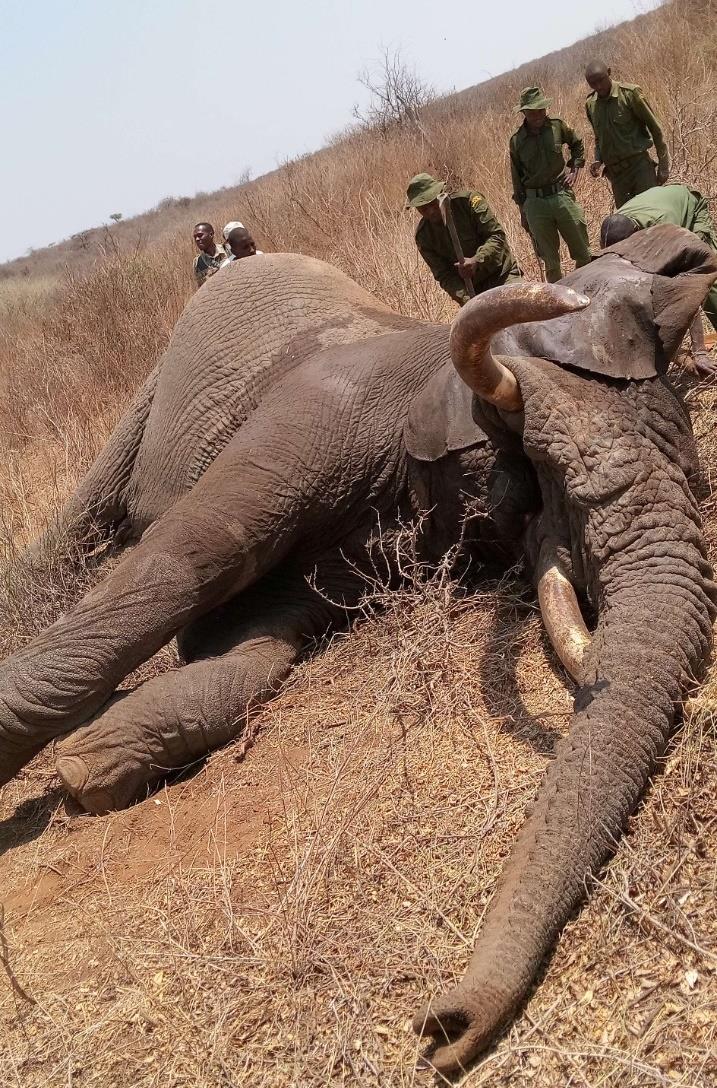
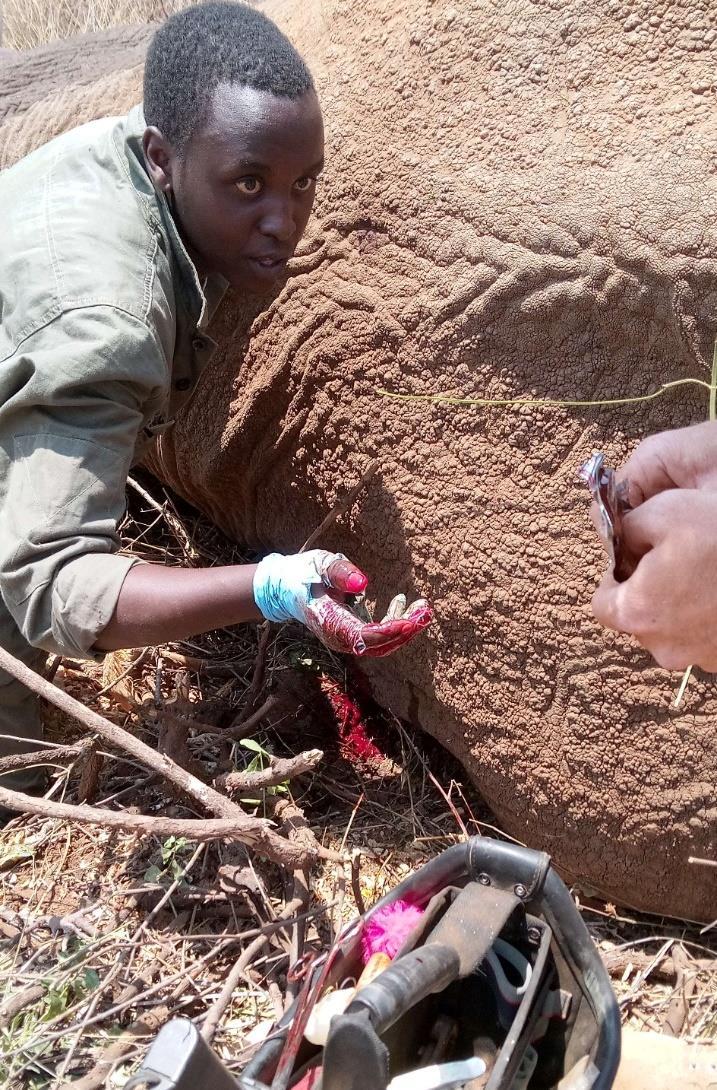
Elephant Spear
Lunga Lunga, South Coast
This elephant was spotted by the community members in Lunga-lunga area who alerted KWS rangers at the area. She was limping on her right forelimb.


Immobilisation, examination and treatment
This elephant was successfully immobilized using 16mg Etorphine hydrochloride delivered remotely in a 3cc Dan inject dart from foot and it took 9 minutes for the drug to achieve its full effects.
Examination revealed a deep spear wound on the right forelimb at the proximal humerus. Small fragments of bones were retrieved from the wound. It was suspected that the elephant had suffered a fracture of the humerus from the spear blow. There was also an arrow wound on the proximal side of the right femur which appeared to be healing. Additionally, she was in a poor body condition. Both wounds were thoroughly cleaned with water, flushed with Hydrogen peroxide, rinsed with water and infused with tincture of Iodine. The wounds were thereafter topically sprayed using an antibiotic. She also received shots of Amoxicillin antibiotics, a metabolic stimulant and Flunixin anti-inflammatories parenterally.
Prognosis
Prognosis is guarded


Case 4 – 5th September 2025
Elephant Snared
Choke Ranch, Taita
This elephant was spotted by KWS rangers in Choke ranch with a wire snare on his neck and right hind limb.
Immobilisation, examination and treatment
This elephant was successfully immobilized using 4mg Etorphine hydrochloride delivered remotely in a 1.5cc Dan inject dart. Darting was done from foot, and it took 8 minutes for full anaesthesia to be achieved.
Examination revealed a winch wire snare on the right knee joint area which had gone all the way around the neck and to the left ear. The snare had inflicted bruises to the affected areas, but the blood supply was intact. The snare was cut using wire cutters and the bruises topically sprayed using an antibiotic.
He also received shots of Oxytetracycline antibiotics and flunixin anti-inflammatories parenterally.
Prognosis
Prognosis is good. .

Case
Elephant Bullet Wound
Voi Stockade, Tsavo East
This was a repeat treatment on a calf that was rescued from Satao with an injured right hindlimb. The elephant had a through and through bullet wound at the knee with marked soft tissue swelling at the area.


Immobilisation, examination and treatment
This calf was successfully tranquillized using 60mg Azaperone from foot. The elephant was then manually restrained with ropes. Examination revealed pus accumulation at the area. The wound was thoroughly cleaned, debrided, flushed with Hydrogen peroxide, rinsed with clean water and infused with tincture of Iodine. The wound was thereafter packed with antibiotic pessaries and a topical antibiotic spray was applied. She also received shots of amoxicillin antibiotics and flunixin anti-inflammatories parenterally.
Another review was done on 17th September. Examination revealed that some pus had accumulated on the wound. The wound was thoroughly cleaned and the pus completely evacuated as before. The wound was thereafter infused with tincture of iodine, packed with antibiotic pessaries and a topical antibiotic spray applied. Additionally, she received shots of meloxicam, amoxicillin and clindamycin antibiotics parenterally.
Prognosis
Prognosis is guarded

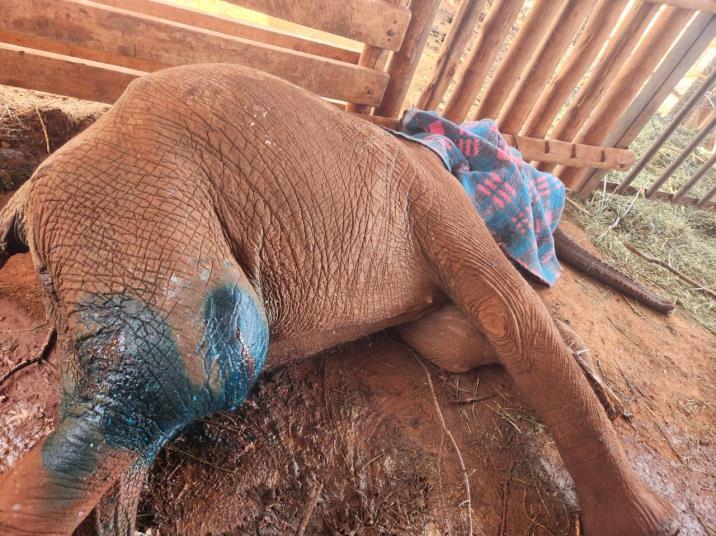
.
Lion
Natural Causes
Voi Wildlife Lodge, Tsavo East
NP
This lion was spotted wounded and unresponsive near the Voi wildlife lodge by the SWT Rangers at the area
Immobilisation, examination and treatment
The lion was successfully immobilized using a combination of 2mg Medetomidine and 100mg Ketamine delivered remotely in a 3 cc Dan inject dart. Darting was done from the vehicle, and it took 10 minutes for full anaesthesia to be achieved.
Examination revealed deep septic wounds on the spine and on the left flank. The injuries were suspected to have been inflicted by a horn in an unsuccessful hunt. The wounds were thoroughly cleaned with water, tincture of Iodine, applied with an antibiotic ointment and then sprayed with a topical antibiotic.
Additionally, he was given rehydrating fluids and received shots of Amoxicillin antibiotics and Meloxicam parenterally.
Prognosis
Prognosis is guarded.

Case
Elephant Arrow Satao, Tsavo East
This elephant was spotted by KWS/SWT rangers during routine patrols in Satao area having a wound on his left flank.

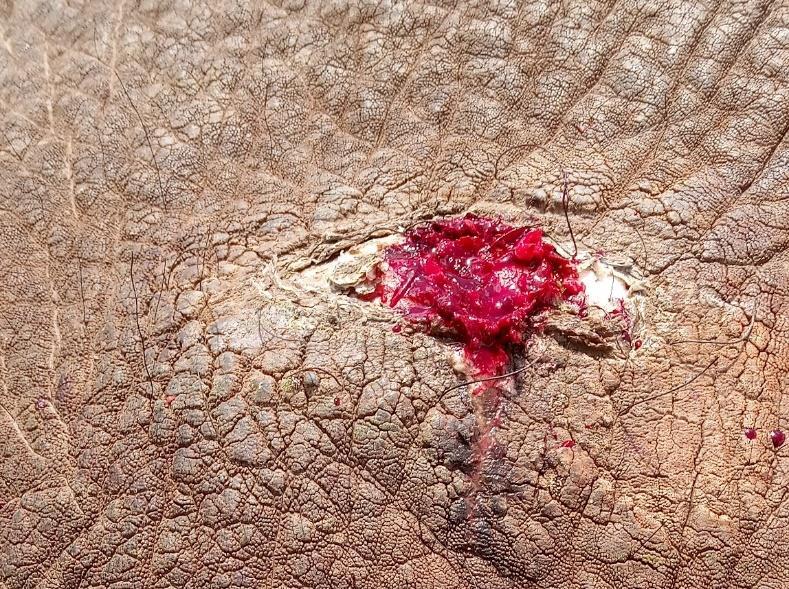
Immobilisation, examination and treatment
This bull was successfully immobilized from a vehicle with 20mg Etorphine hydrochloride delivered remotely in a 3cc Dan inject dart and it took 8 minutes for the elephant to be fully anaesthetised.
Examination revealed a deep septic arrow wound on the left flank area. The wound was cleaned and debrided thoroughly. This was followed by flushing with Hydrogen peroxide, rinsing thoroughly with water and infusing with tincture of Iodine. The wound was then packed with antibiotic pessaries and topical antibiotic spray application.
Additionally, he received shots of amoxicillin antibiotics and flunixin anti-inflammatories parenterally.
Prognosis
Prognosis is good

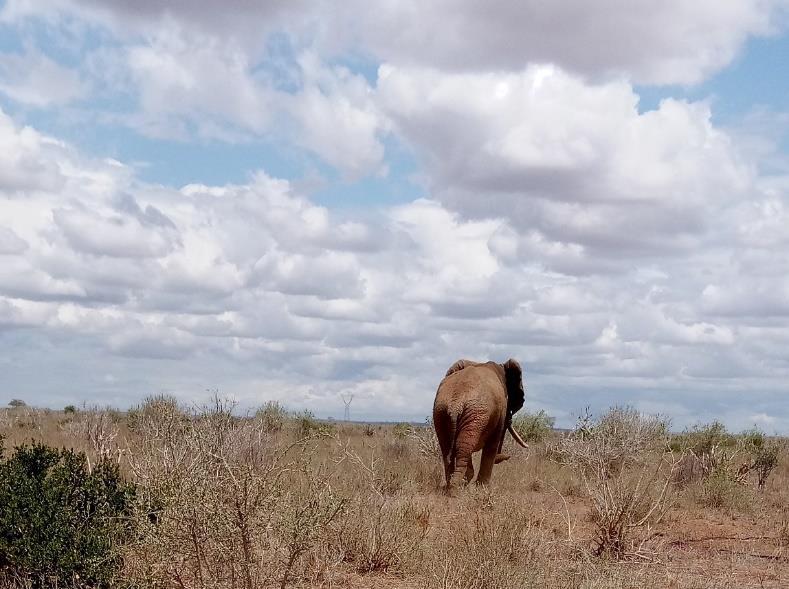
Case 8 – 8th September 2025
Elephant Postmortem
Voi Park Airstrip, Tsavo East NP
This carcass was found on the morning of 8th September at Voi Park airstrip area by the SWT rangers at the area. TMVU was requested to determine the cause of death.
Postmortem examination
The female elephant was found on left lateral recumbency. The carcass was fairly fresh, and no external wounds were seen. Significant finds are as follows.
• There was marked pericarditis
• The liver was severely congested with diffuse haemorrhages
• There was excess blood-tinged pericardial fluid with fibrinous material and suspended necrotic fat
• There were large fat masses in the chest cavity impinging on the lungs
• There was pulmonary oedema with froth in the bronchioles
• The mucous membranes were cyanotic
• The blood was dark as a result of hypoxia
Cause of death
Cause of death was chronic pericarditis with compromised breathing by the fatty mass in the thoracic cavity.
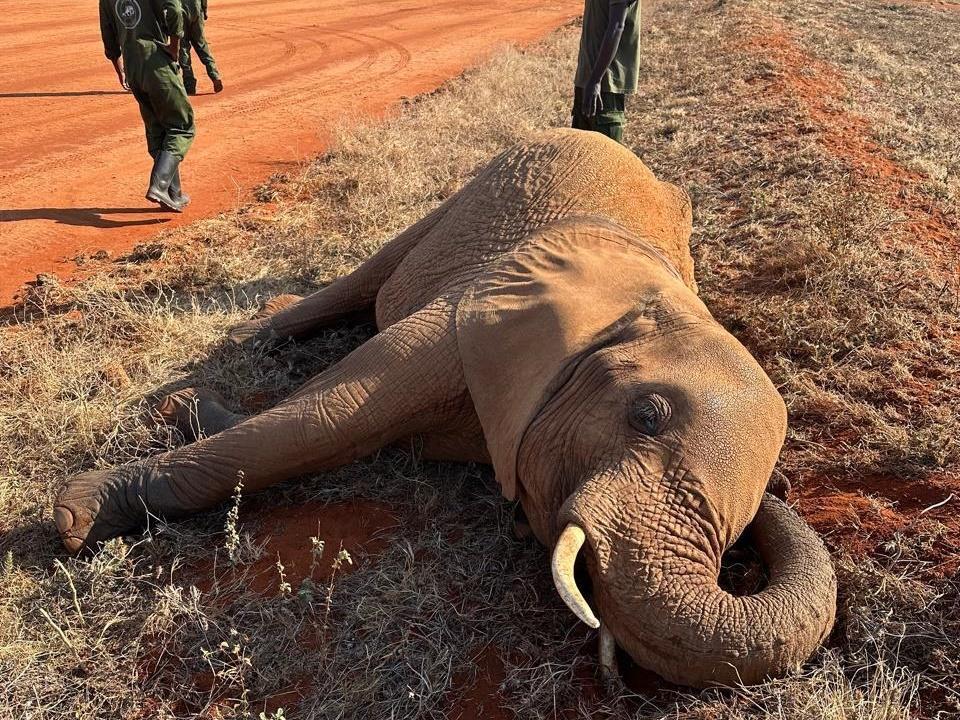
Kudu Natural Causes
This lesser kudu was reported by the Haller park management to have one broken horn hanging and was bleeding at the area.
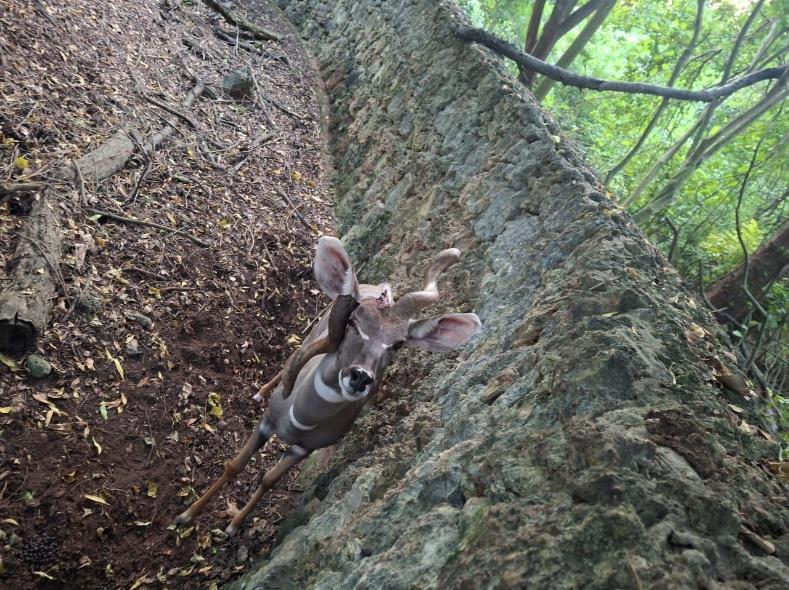
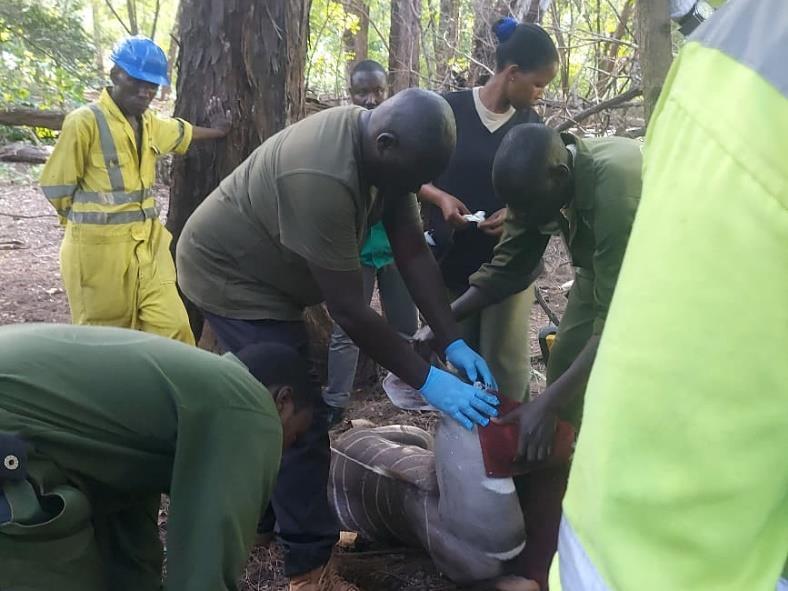
Immobilisation, examination and treatment
He was successfully immobilized using a combination of 6.5mg Etorphine hydrochloride and 50mg of Azaperone delivered remotely in a 3cc Dan inject dart. Darting was done from foot, and it took 7 minutes for the drugs to achieve its full effects.
Examination revealed a broken right horn. The horn had dropped off by the time the team arrived. The sinuses were cleaned thoroughly and flushed with Hydrogen peroxide, infused with tincture of Iodine, applied with an antibiotic ointment and topical antibiotic spray.
Prognosis
He was reversed from anaesthesia using 65mg Naltrexone hydrochloride given intravenously via the jugular vein. He rose few minutes later and ran away into the bushes Prognosis is good .
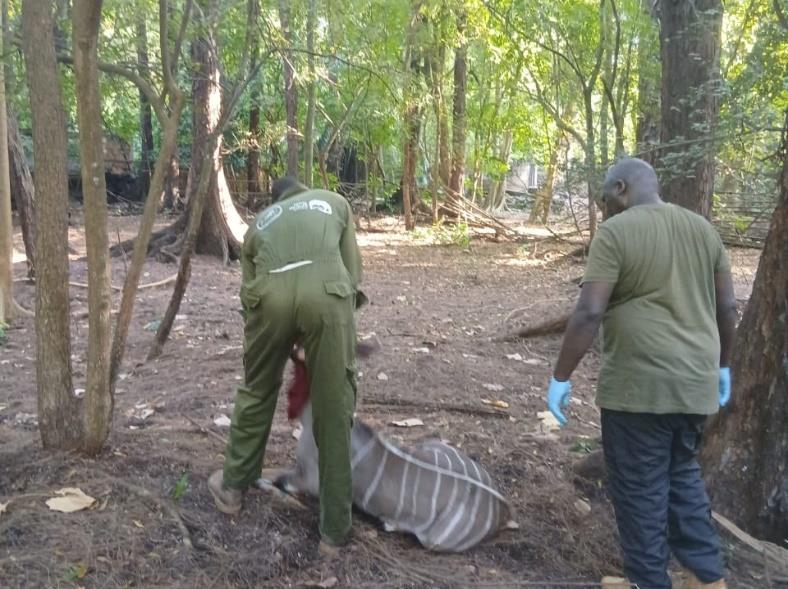

Haller Park, Mombasa
Case 10 – 11th September 2025
Hyena Natural Causes Ngolia, Tsavo East
This hyena was reported by the community members in Ngolia area to have entered a building. He was wounded and appeared to be weak.
Immobilisation, examination and treatment
This hyena was immobilized from foot with a combination of 3mg Medetomidine and 180mg of Ketamine delivered remotely in a 3 cc Dan inject dart. It took 7 minutes for the hyena to be fully anaesthetized.
Examination revealed multiple bite wounds likely to have been inflicted by other hyenas. The wounds were cleaned, flushed with Hydrogen peroxide and infused with a tincture of Iodine then sprayed with a topical antibiotic. The wounds on the left thigh and left foot pad were sutured accordingly before spraying with the topical antibiotic spray.
He was given Amoxicillin antibiotics and meloxicam anti-inflammatories parenterally.
Prognosis
He was relocated to Tsavo East National Park. The prognosis is guarded.
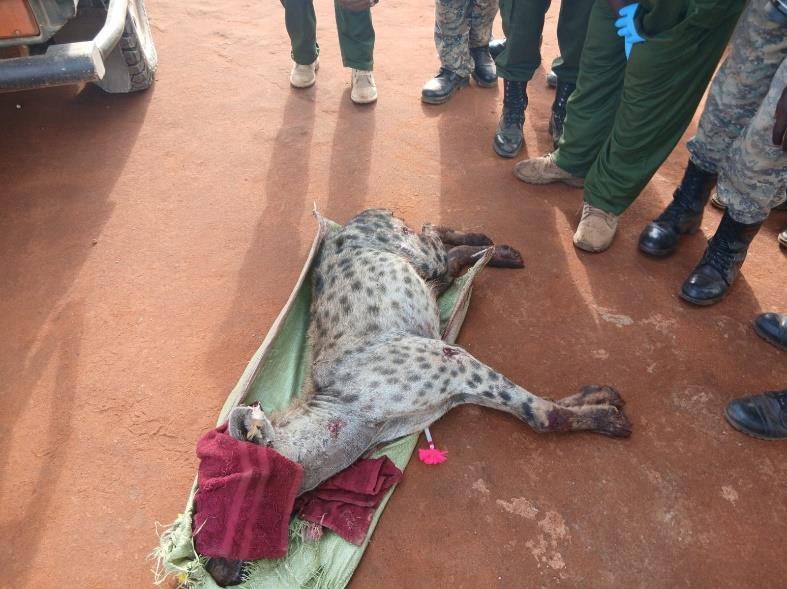
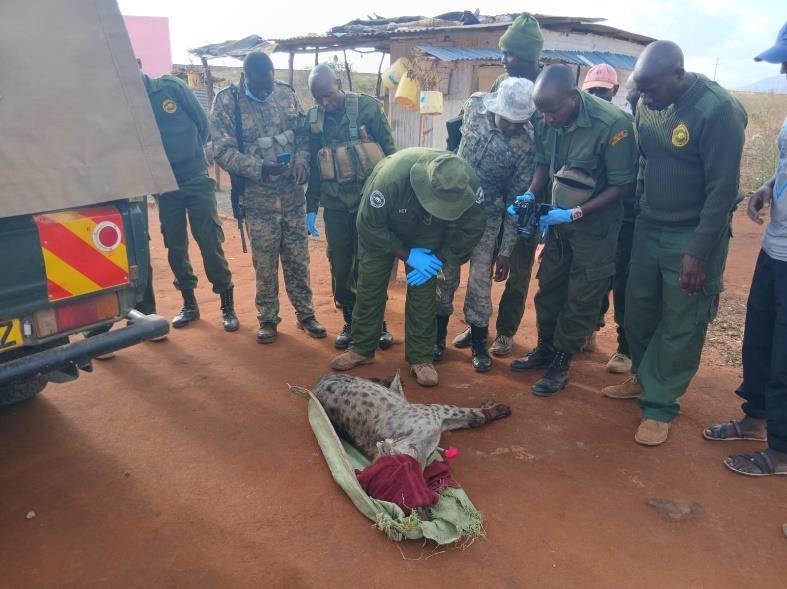


Case
Elephant Spear Galdessa, Tsavo East National Park
This injured elephant was spotted by the SWT/KWS team in Galdesa area injured and limping on her right hind limb.
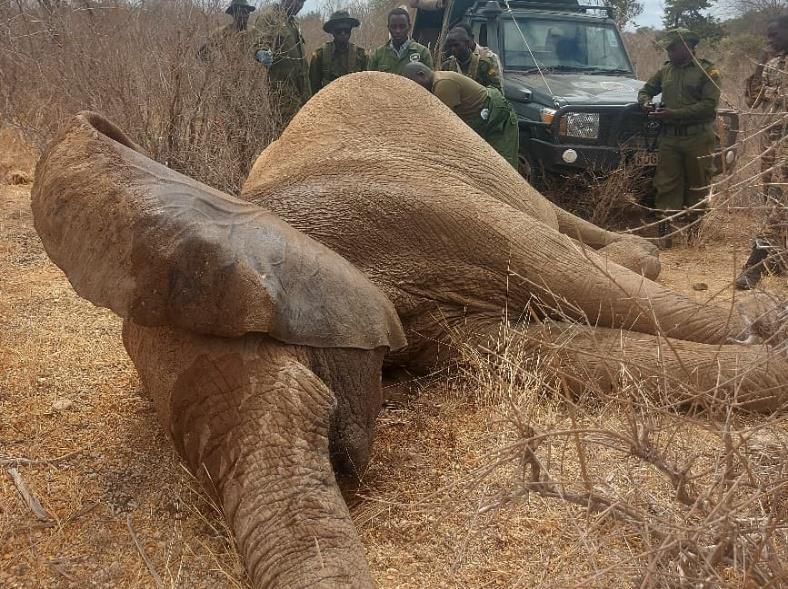

Immobilisation, examination and treatment
This elephant was successfully immobilized using 18mg Etorphine hydrochloride delivered remotely in a 3cc Dan inject dart. Darting was done from the vehicle, and she was under anaesthesia 11 minutes later.
Examination revealed deep septic spear wounds at the base of the tail and two at the right hip. The wounds were thoroughly cleaned, debrided, flushed with Hydrogen peroxide, rinsed with clean water and infused with tincture of Iodine. The wounds were thereafter packed with antibiotic pessaries, and a topical antibiotic spray was applied. She was additionally given Amoxicillin antibiotics and Flunixin parenterally.
Prognosis
She was revived from anaesthesia using 200mg Naltrexone hydrochloride given intravenously via a prominent ear vein. She rose few minutes later and slowly walked away. Prognosis is good.


Case 12 – 15th September 2025
Elephant Natural Causes Galdessa, Tsavo East National Park
This elephant was spotted by visitors to the park in the Irima area with a broken tusk stuck on to the ventral side of his neck and he was limping on his right hind limb.
Immobilisation, examination and treatment
This bull was successfully immobilized using 20mg Etorphine hydrochloride delivered remotely in a 3cc Dan inject dart. Darting was done from the vehicle, and it took 8 minutes for full anaesthesia to be achieved.
Examination revealed a swollen tarsal and a suspected closed fracture of the distal tibia fibular bone. He also had a piece of broken tusk approximately 1.5 feet stuck on the ventral right side of his neck which was then pulled out. The wound was thoroughly cleaned, flushed with Hydrogen peroxide and infused with tincture of iodine and thereafter sprayed with a topical antibiotic. Additionally, he received shots of amoxicillin antibiotics and flunixin anti-inflammatory parenterally.
Prognosis
The elephant briefly went into apnea/shock and was reversed immediately and given adrenaline injection intravenously. CPR was also performed. Prognosis is guarded. His progress will be monitored over some period and further advise and recommendation given based on development of his progress. .
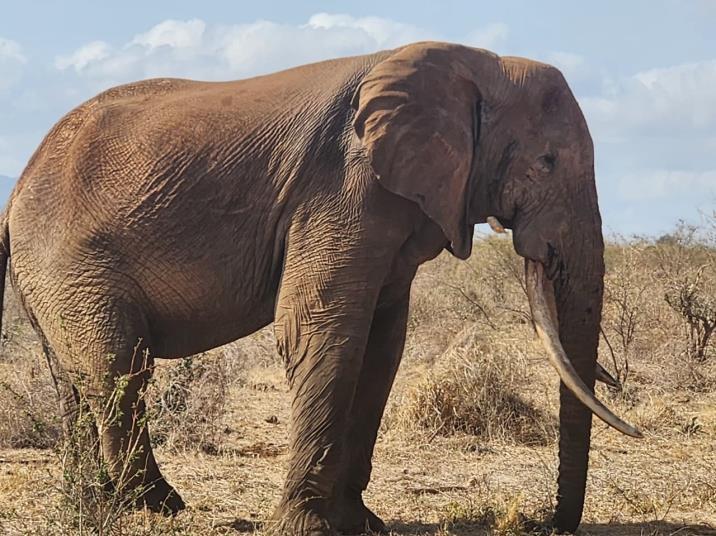
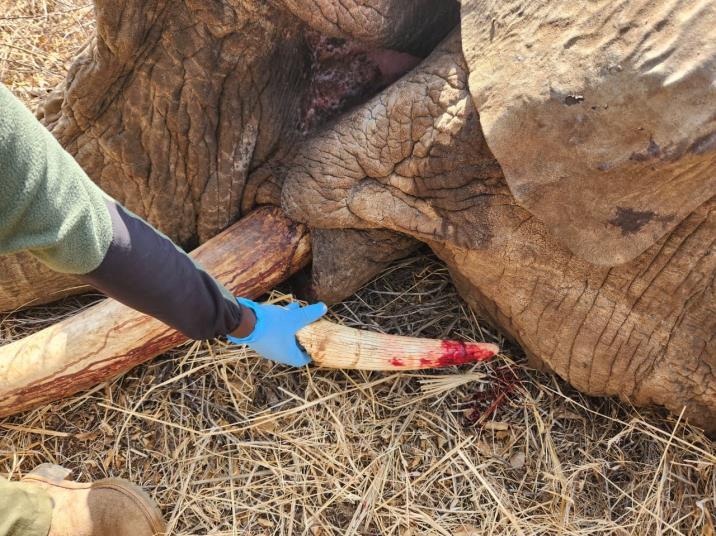
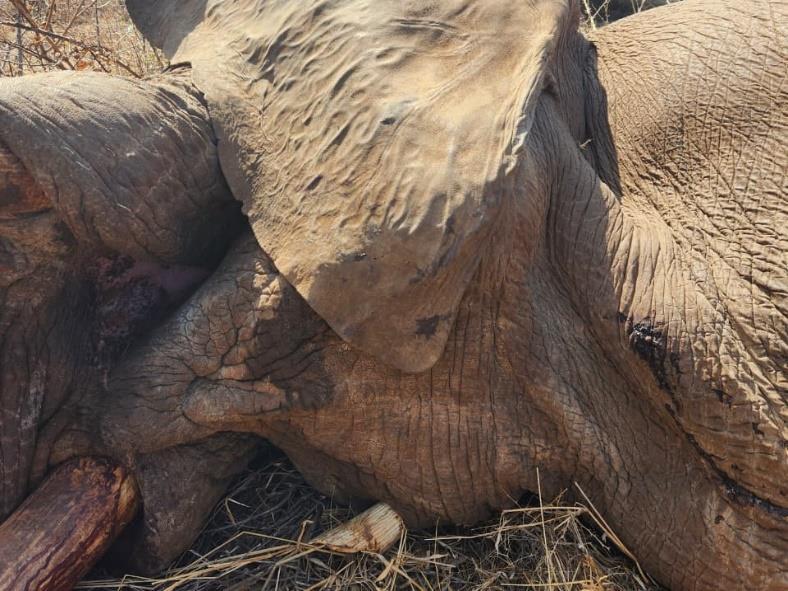
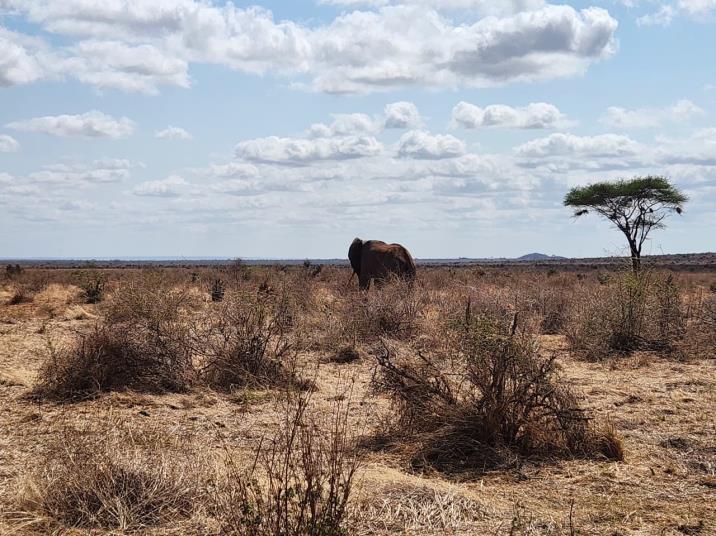
Case 13 – 15th September 2025
Elephant Spear
Mtito Gate, Tsavo West NP
An elephant carcass was found on the morning of 15th September by KWS rangers near Mtito gate during their patrol. This elephant had been treated twice before for a spear wound on the right side of his face and partly severed trunk likely from an attack with a machete.
Postmortem examination
The elephant had an enlarged abdomen. There was a muco-purulent discharge from the trunk. Significant finds are as follows.
• There was marked ascites
• The lung bronchioles and alveoli were filled with a purulent stuff. This was likely from infection that descended from the infected trunk wounds
• The lung parenchyma was moulted with identifiable areas of infarcts
• The liver was significantly cirrhotic
Cause of death
It was concluded that the elephant died from lung infection affecting alveolar functions. Liveris thought cirrhosis was an incidental finding though it could not have caused immediate death. .
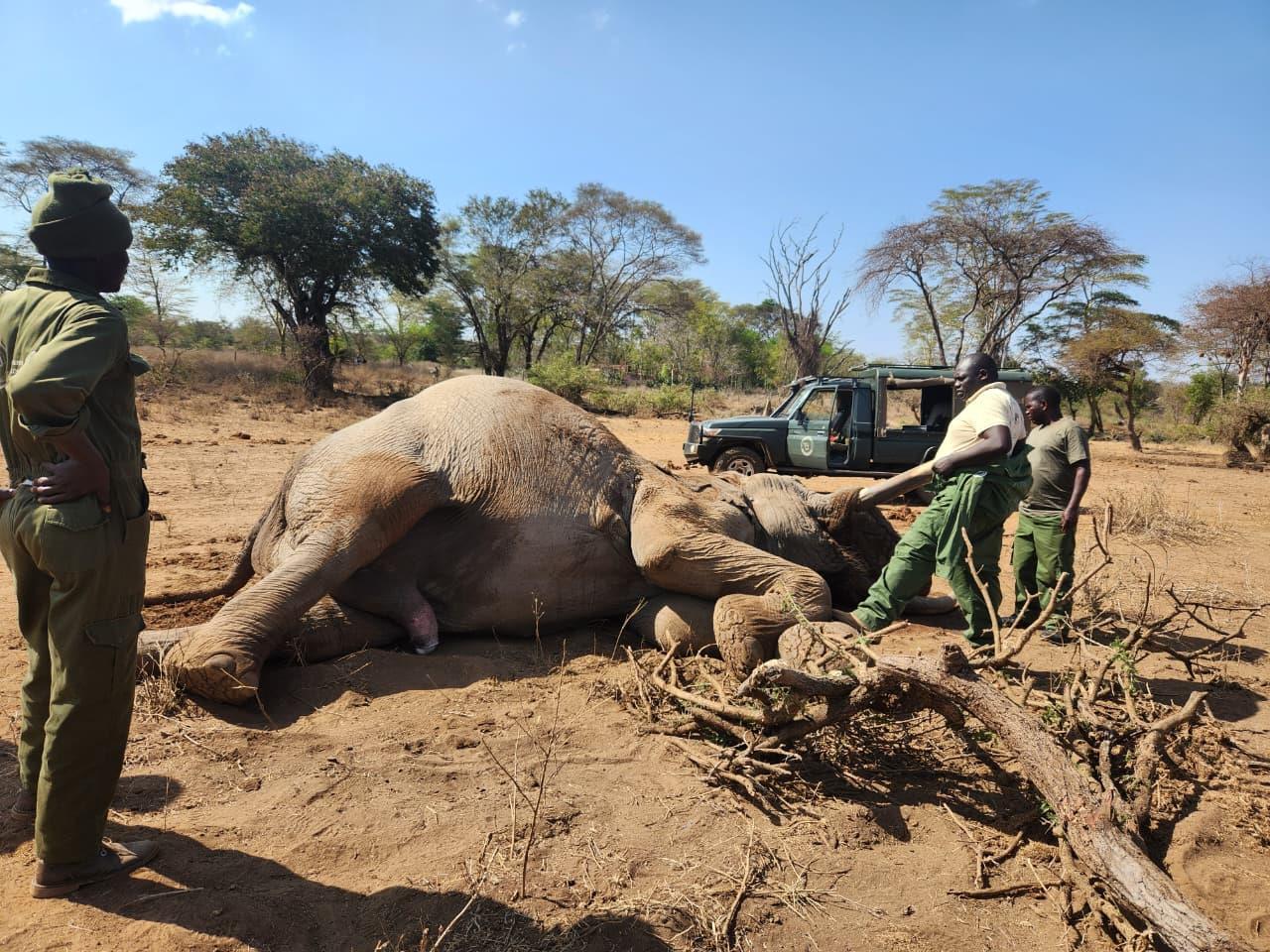
Elephant Spear
Taita Sisal Estate
This elephant was spotted by the Taita sisal management with a wound on his left rump.


Immobilisation, examination and treatment
This bull was darted from a helicopter and successfully immobilized using 20mg Etorphine hydrochloride delivered remotely in a 3cc Dan inject dart. It took 10 minutes for full anaesthesia to be achieved.
Examination revealed a deep septic arrow wound on the left rump and on the right elbow joint. An arrowhead was surgically retrieved from the muscles of the rump. The wounds were thoroughly cleaned. This was followed by flushing with Hydrogen peroxide, rinsing thoroughly with water and infusing with tincture of Iodine. The wounds were then packed with antibiotic pessaries and topical antibiotic spray application. Additionally, he received shots of amoxicillin antibiotics and flunixin anti-inflammatory
Prognosis
He was reversed from anaesthesia using 200 mg of Naltrexone hydrochloride given intravenously via the ear vein. He rose few minutes later and walked away into the bushes. Prognosis is good.

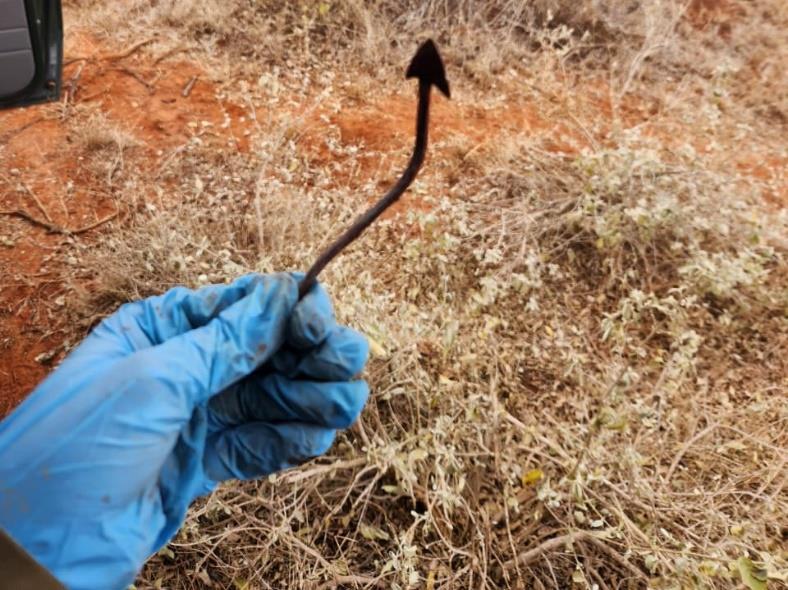
Case 15 – 18th September 2025
Elephant Spear
Taita Sisal Estate
This elephant was spotted by the Taita sisal management at the area with a wound on his right flank.
Immobilisation, examination and treatment
This bull was successfully immobilized using 20mg Etorphine hydrochloride delivered remotely in a 3cc Dan inject dart. Darting was done from the helicopter, and the elephant was under full anaesthesia in 10 minutes.
Examination revealed a deep septic spear wound on the right flank. The wound was thoroughly cleaned with water, Hydrogen peroxide, rinsed with water and infused with tincture of Iodine. The wound was thereafter packed with antibiotic pessaries, green clay application and sprayed with a topical antibiotic.
He also received shots of Amoxicillin antibiotics parenterally.
Prognosis
Prognosis is good. .
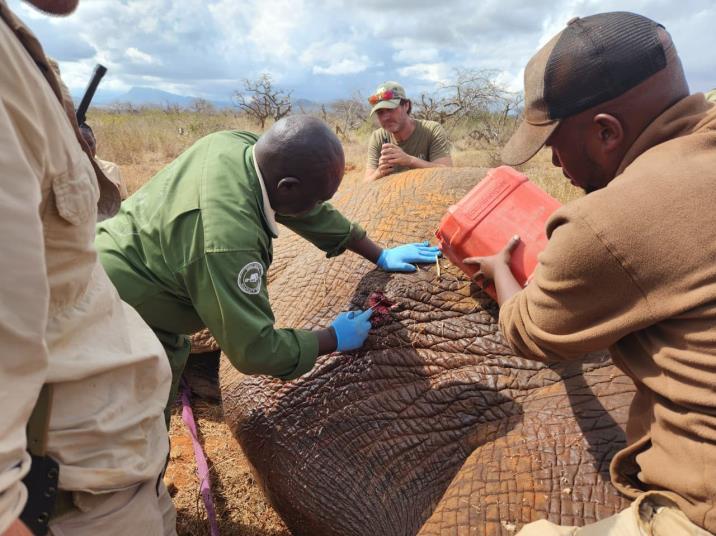
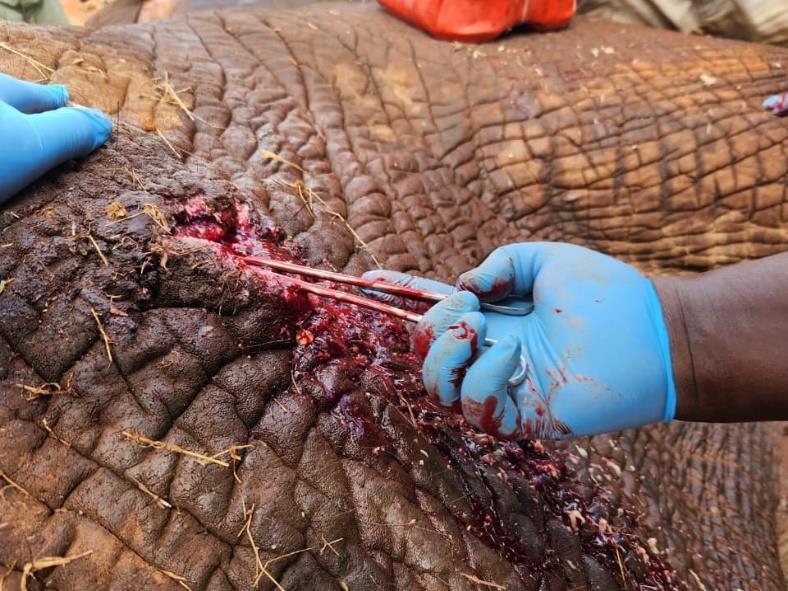

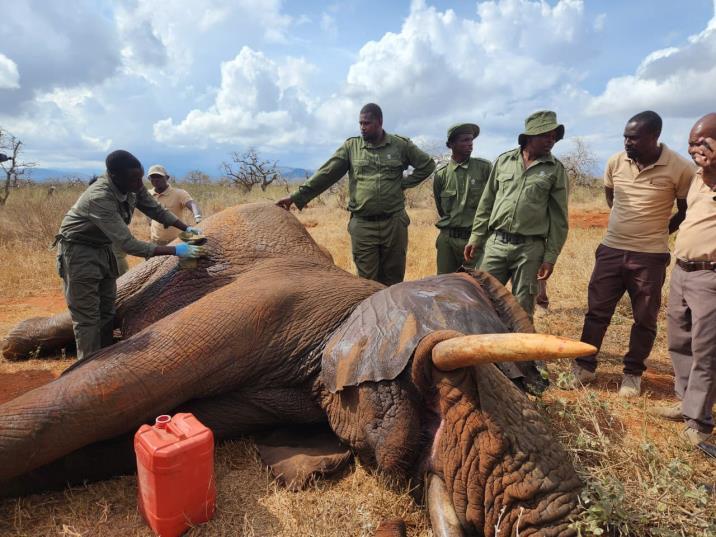
Case
16 – 20th September 2025
Zebra Snared Ndii, Tsavo East NP
This zebra was spotted by SWT rangers in Ndii area, along the Mombasa road highway having a wire snare around his neck.
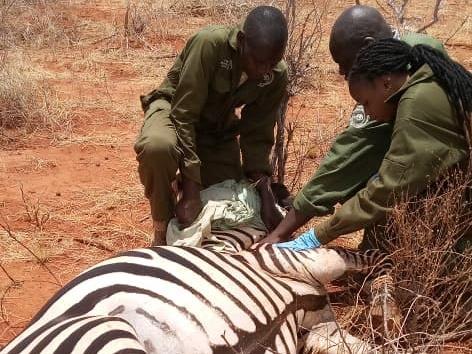
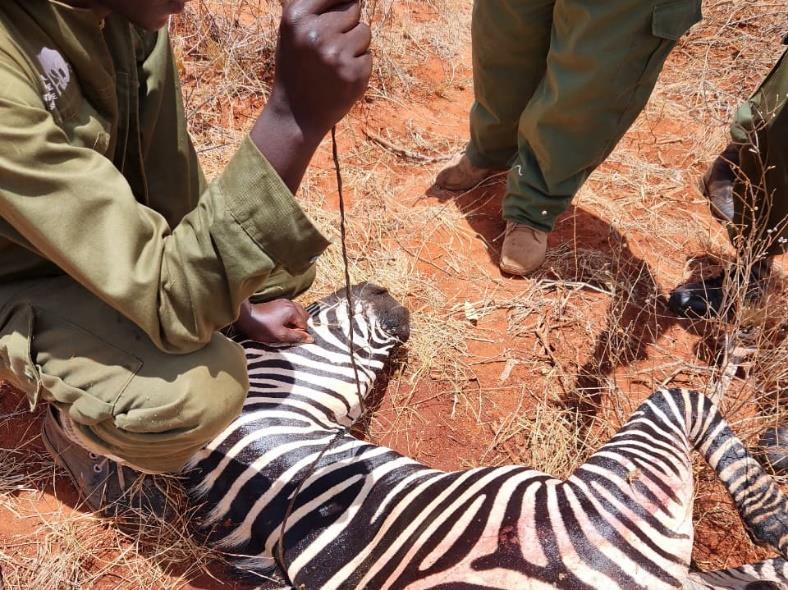
Immobilisation, examination and treatment
She was successfully immobilized using a combination of 6mg Etorphine hydrochloride and 60mg of Azaperone delivered remotely in a 3cc Dan inject dart. Darting was done from foot and it took 7 minutes for the drugs to achieve its full effects.
Examination revealed a winch wire snare on her neck area. The snare had not inflicted any wounds, so no treatment was required. The snare was cut using wire cutters.
Prognosis
Prognosis is good.

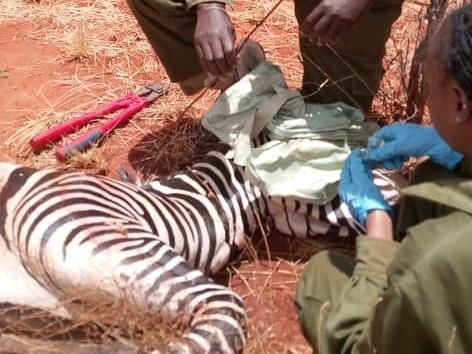
.
Case 17 – 20th September 2025
Lion
Human-Wildlife Conflict
Ngiluni, Tsavo East NP
A collared lioness carcass was found on the morning of 20th September by SWT rangers in Ngiluni area.
Postmortem examination
The carcass was in advanced stage of decomposition hence no meaningful post-mortem and interpretation could be done.
The stomach contents consisted of a goat’s skin.
Cause of death
The cause of death was suspected to be poisoning. Stomach contents were taken for toxicological examination.
The collar was removed by KWS rangers for safekeeping.

Elephant Spear
Amboseli National Park
This injured elephant was spotted by the KWS team in Amboseli limping on his right forelimb.
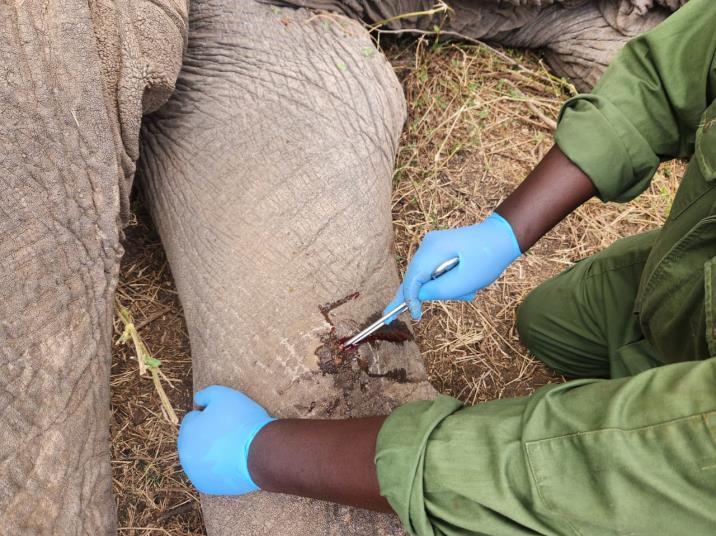
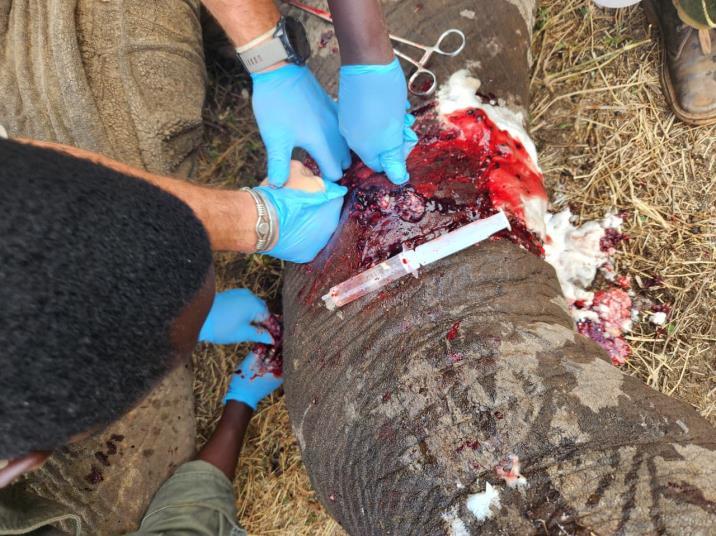
Immobilisation, examination and treatment
This bull was successfully darted from a vehicle and immobilized using 17mg Etorphine hydrochloride delivered remotely in a 3cc Dan inject dart. It took 10 minutes for the drug to achieve its full effects.
Examination revealed a deep septic spear wound on the medial right radiocarpal joint. He also had poor body condition. The wound was thoroughly cleaned and debrided. This was followed by flushing with Hydrogen peroxide and rinsing the wound thoroughly with water. The wound was thereafter infused with tincture of Iodine, packed with antibiotic pessaries and topically sprayed using a topical antibiotic.
He received shots of amoxicillin antibiotics, a metabolic stimulant and flunixin anti-inflammatories.
Prognosis
Prognosis is guarded.


.
Case
Elephant Natural Causes/ Postmortem Taita Hills Sanctuary
A collared lioness carcass was found on the morning of 20th September by SWT rangers in Ngiluni area.
Immobilisation and examination
This elephant was successfully immobilized using 18mg Etorphine hydrochloride delivered in a 3cc Dan inject dart. Darting was done from foot, and it took 9 minutes for the drug to achieve its full effect.
Examination revealed a closed fracture of the left femur with marked soft tissue swelling. The elephant’s prognosis was grave, and the team saw it fit to euthanize him on animal welfare grounds to alleviate his further pain and suffering.
Cause of death
A postmortem examination revealed that he had suffered a complete comminuted mid-diaphyseal fracture of the left femur
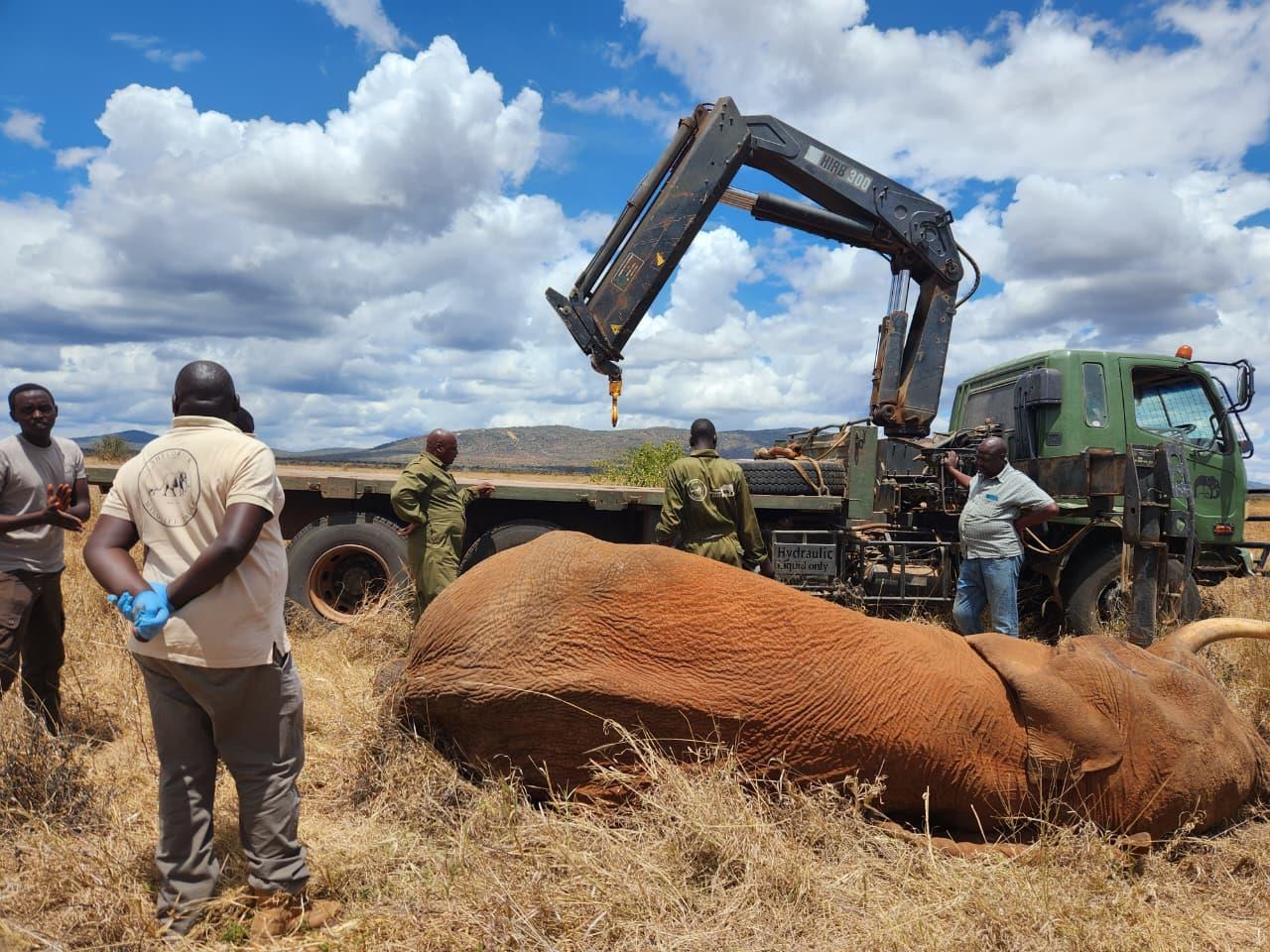
Elephant Spear Satao, Tsavo East NP
This elephant bull was spotted by the SWT pilot in the Satao area wounded on both his left hind limb and left forelimb.
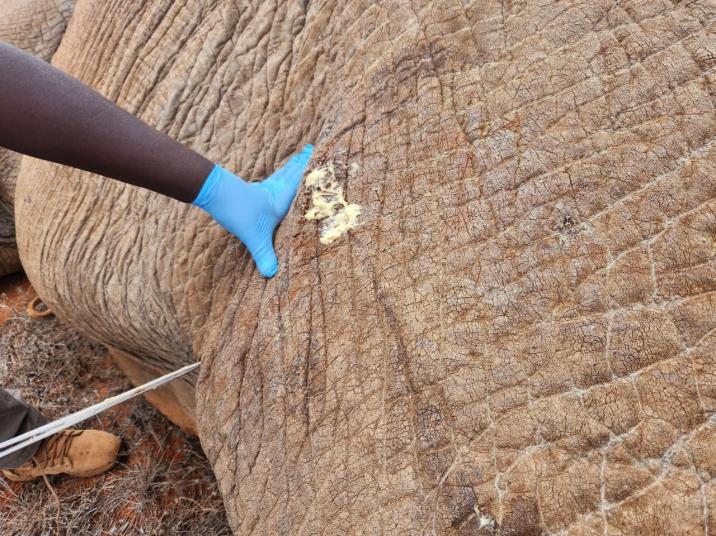
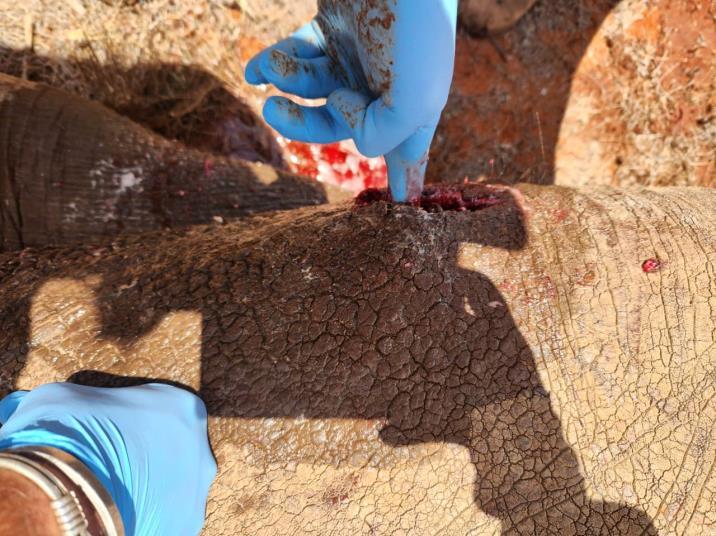
Immobilisation, examination and treatment
This bull was successfully immobilized using 20 mg Etorphine hydrochloride delivered in a 3cc Dan inject dart. Darting was done from the vehicle, and it took 10 minutes for full anaesthesia to be achieved.
Examination revealed an arrow wound on his left hindlimb which was healing but still had a bit of pus, he was treated before for this specific wound and an arrowhead retrieved. There was also a fresh, deep spear wound on the anterior left distal humerus just below the elbow joint.
The wounds were thoroughly cleaned, flushed with Hydrogen peroxide, rinsed with clean water and infused with tincture of Iodine. The wounds were thereafter packed with antibiotic pessaries and a topical antibiotic spray was applied. The fresh spear wound was packed with green clay before spraying with the topical antibiotic. He also received shots of Amoxicillin antibiotics parenterally.
Prognosis
Prognosis is good
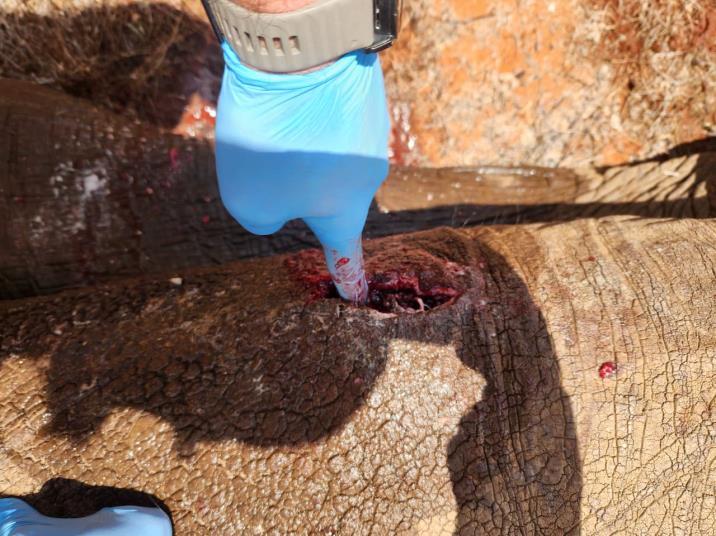

Case 21 – 23rd September 2025
Elephant Postmortem
Sentrim, Tsavo East NP
An elephant carcass was found on the afternoon of 23rd September by KWS rangers in the area.
Postmortem examination
The carcass was 3-4 days old.
The carcass had been extensively scavenged upon.
Cause of death
The cause of death could not be grossly determined since the carcass was extensively scavenged upon and partially autolysed.
Both tusks were intact and were taken by KWS rangers for safekeeping

Case
Serval Cat
Human-wildlife Conflict
Maungu, Taita
This injured serval cat was reported by wildlife works rangers/KWS rangers in Maungu area to have been hit by a vehicle along the highway.
Immobilisation, examination and management
The cat was successfully immobilized using a combination of 0.8mg medetomidine and 50mg ketamine delivered remotely in a 1.5 cc Dan inject dart. Darting was done from foot, and it took 10 minutes for the cat to be fully anaesthetized.
Examination revealed a complete open fracture of both the right and the left distal femur.
The cat was then euthanized on animal welfare grounds to save him from further suffering.
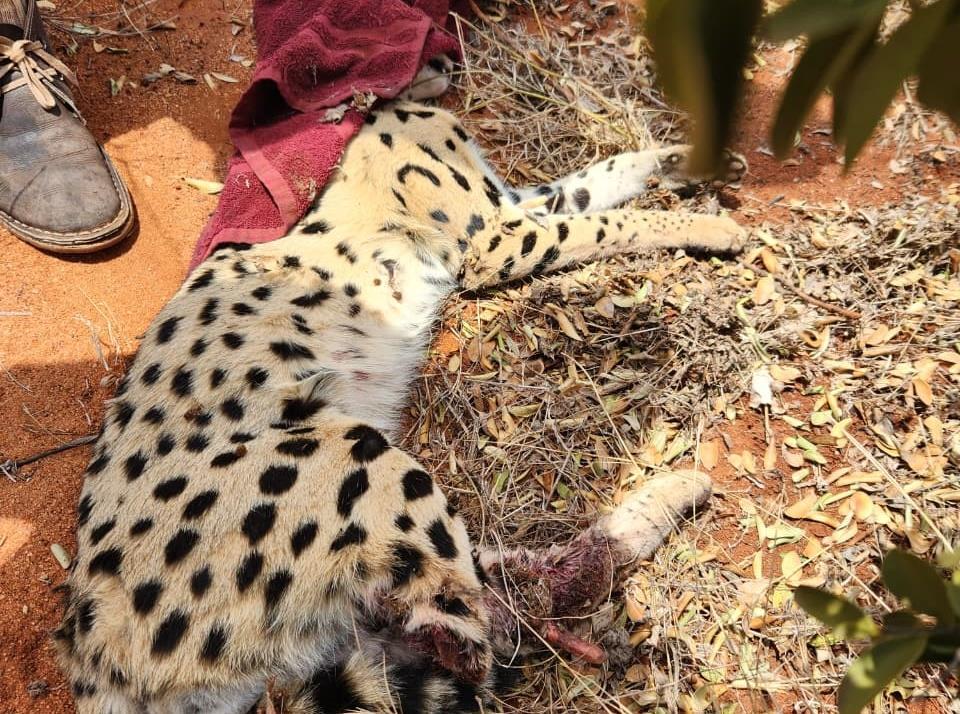
Elephant Bullet Wound
Ranch
This elephant was spotted by the SWT pilot in Galana area wounded on his left forelimb.

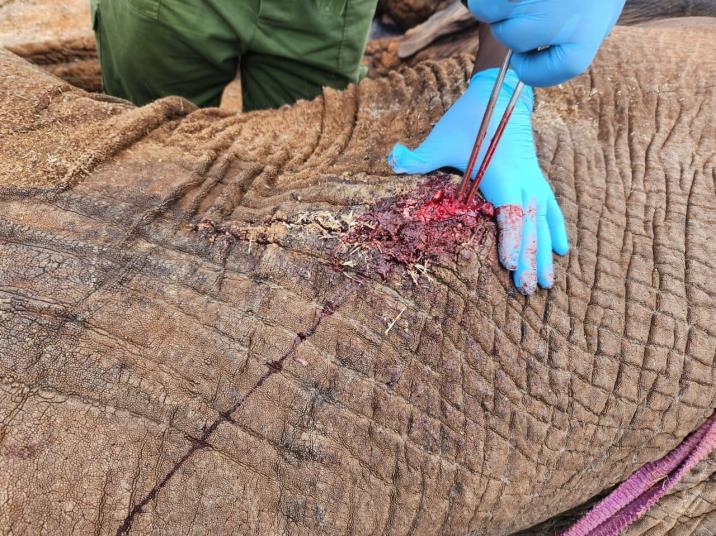
Immobilisation, examination and treatment
This elephant was successfully immobilized using 18mg Etorphine hydrochloride delivered in a 3cc Dan inject dart. Darting was done from the helicopter, and it took 11 minutes for the drug to achieve its full effect.
Examination revealed a through and through wound, from a high velocity projectile entering the medially through the distal humerus and exiting near the elbow joint. The wound was thoroughly cleaned with water, debrided with Hydrogen peroxide, rinsed with water and infused with tincture of Iodine. The wound was thereafter packed with antibiotic pessaries and sprayed with a topical antibiotic.
He was given Amoxicillin antibiotics and Meloxicam parenterally.
Prognosis
Prognosis is good No bony tissue was involved. Only soft tissues were affected.


Galana
Case
Lion
Natural Causes
This lioness was spotted with an injury to the lower jaw and a broken tooth by visitors to the park.
Immobilisation, examination and treatment
The lioness was successfully immobilized using a combination of 4.8mg Medetomidine and 200mg Ketamine delivered remotely in a 3 cc Dan inject dart. Darting was done from the vehicle, and it took 10 minutes for full anaesthesia to be achieved.
Examination revealed an injured lower jaw with the lower left canine partially dislodged from the gum. There was also a wound on her right elbow joint. The injuries were suspected to have been inflicted during a hunt. The tooth was surgically extracted, and the wounds were thoroughly cleaned with water, tincture of Iodine, and an antibiotic ointment applied. The wound on the elbow was cleaned and then sprayed with a topical antibiotic. Additionally, she received shots of Amoxicillin antibiotics and Meloxicam pain killer parenterally.
Prognosis
Prognosis is good. She was reversed from anaesthesia using 24 mg of Atipamezole given intramuscularly. She rose few minutes later and walked away into the bushes.
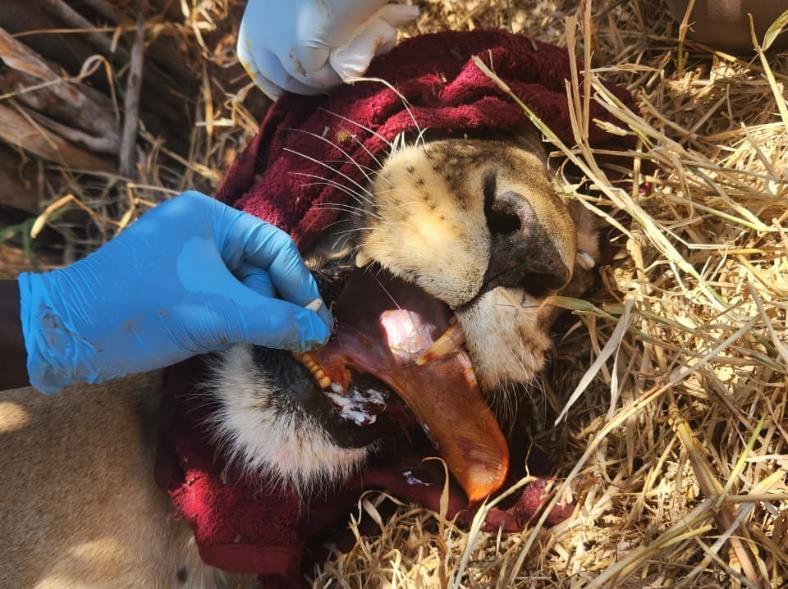
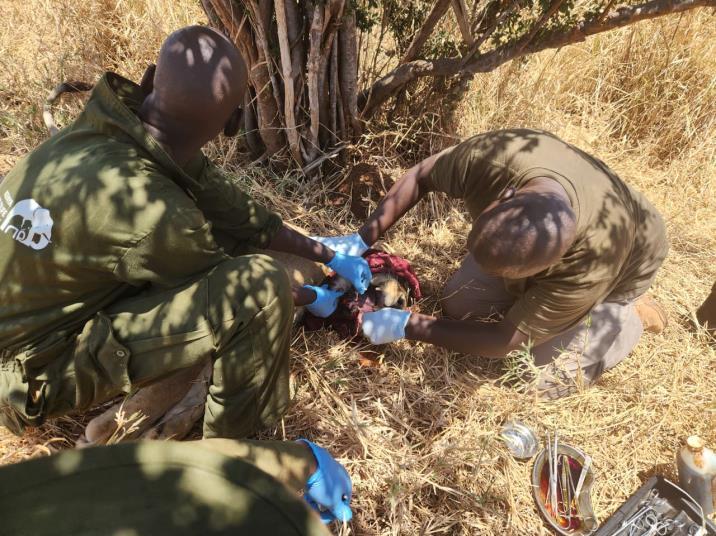

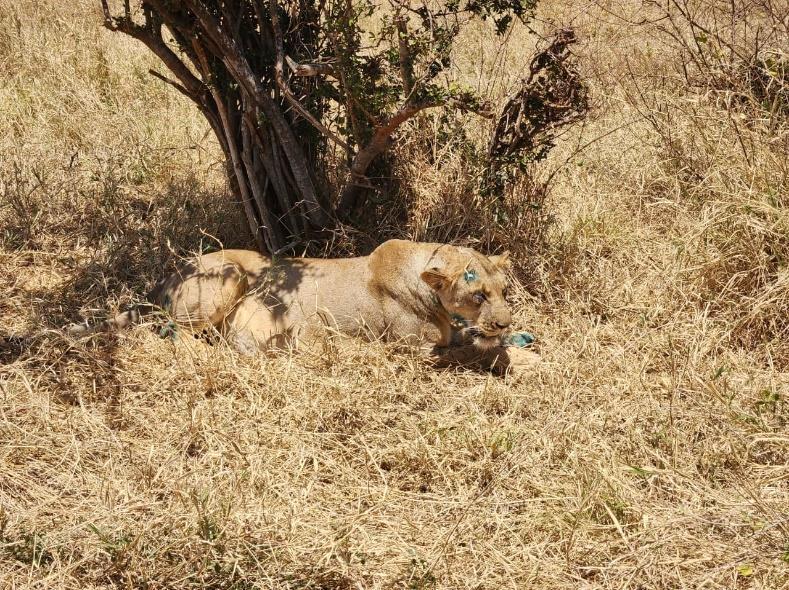
Tsavo East National Park
Elephant aRROW Ndatani, Kilifi
This elephant was spotted by SWT pilot during routine patrols with having a wound on her right flank
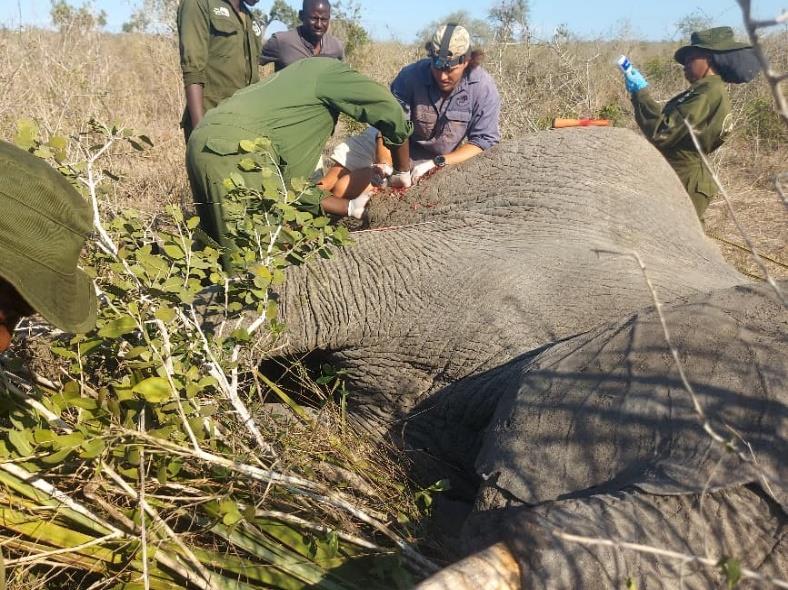

Immobilisation, examination and treatment
This elephant was successfully immobilized using 20mg Etorphine hydrochloride delivered remotely in a 3cc Dan inject dart. Darting was done from the helicopter, and it took 9 minutes for the elephant to be fully anaesthetised.
Examination revealed a deep septic arrow wound on the right flank area. The septic wound was cleaned thoroughly, followed by flushing with Hydrogen peroxide, rinsing thoroughly with water and infusing with tincture of Iodine. The wound was then sprayed with a topical antibiotic
Additionally, she received shots of Amoxicillin antibiotics and Meloxicam anti-inflammatory parenterally.
Prognosis
Prognosis is good. She was reversed from anaesthesia using 200mg of Naltrexone hydrochloride given intravenously via the ear vein. She rose 3 minutes later and walked away into the bushes

